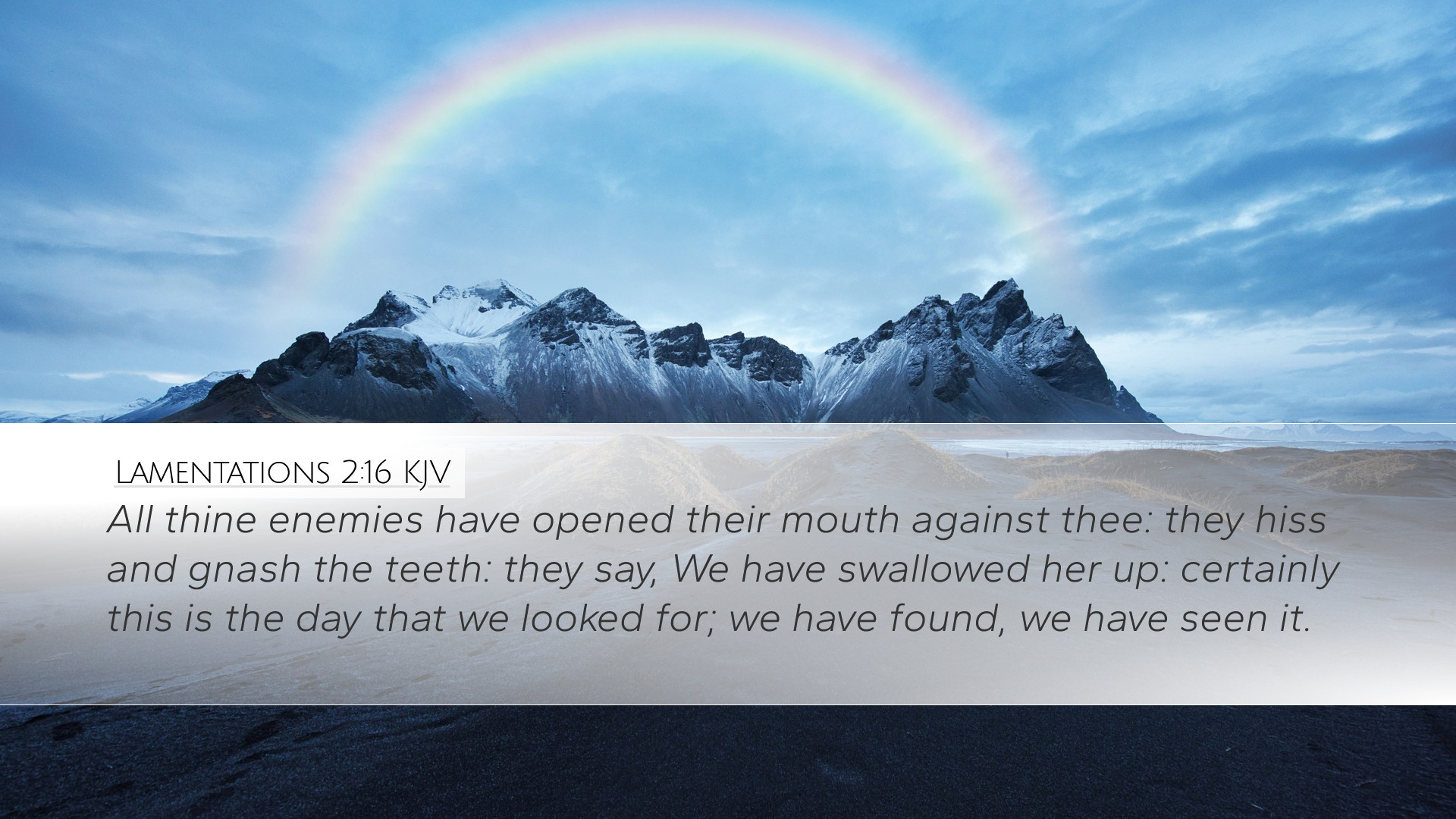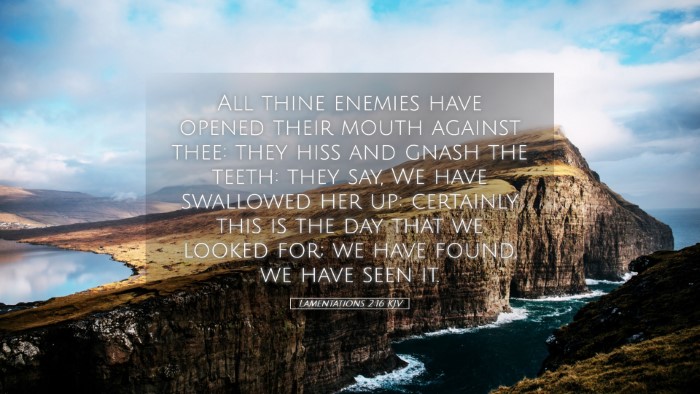Lamentations 2:16 Commentary
Verse Text: "All thy enemies have opened their mouth against thee: they hiss and gnash the teeth: they say, We have swallowed her up: certainly this is the day that we looked for; we have found, we have seen it."
Introduction
The book of Lamentations, attributed to the prophet Jeremiah, is a poignant reflection on the devastation of Jerusalem following its destruction. In this particular verse, Lamentations 2:16, the anguish of the Israelites is palpable—a cry of desperation as they witness their enemies reveling in their downfall. The purpose of this commentary is to delve into the deep significance of this verse, drawing insights from various public domain commentaries to enrich our understanding.
Contextual Background
Before examining the verse itself, it is essential to understand the historical backdrop. The siege of Jerusalem by the Babylonians culminated in a catastrophic outcome for the Jewish people. The destruction of the city and the temple marked a significant turning point, symbolizing not only physical loss but spiritual desolation. This chapter, filled with sorrow, highlights the mockery faced by the remnant of Judah from their enemies.
Insights from Matthew Henry
Matthew Henry emphasizes the scorn and derision shown by the enemies of Israel. He notes that the enemies "hiss and gnash their teeth," which illustrates their glee and unrestrained satisfaction at Israel's calamity. Henry points out that this verse reflects the complete humiliation of God’s people, who were once proud but now face shame and disgrace. The phrase "we have swallowed her up" indicates a total victory over Israel, portraying the enemies’ perception that they have not just defeated a city, but have eradicated an entire nation.
Insights from Albert Barnes
Albert Barnes provides a detailed analysis of the enemies’ declaration. He interprets "the day that we looked for" as a prophetic acknowledgment of their satisfaction in their successful siege and conquest of Jerusalem. Barnes elucidates that this reflects the ultimate victory of evil over good, a theme common in the literature of suffering. He also reminds readers that this verse carries a deeper spiritual implication, where the destruction of Jerusalem is a metaphor for sin's triumph in the life of an individual or nation that turns away from God.
Insights from Adam Clarke
Adam Clarke offers additional depth by exploring the emotional state of the Israelites during this moment of national tragedy. He acknowledges the intense pain felt as enemies publicly mock and deride them. Clarke interprets the enemies’ hissing as a direct affront, suggesting that such mockery is a significant sign of victory in ancient warfare. He emphasizes the desperation of the Israelites, who not only face physical destruction but also deep spiritual anguish. Clarke invites readers to reflect on the implications of this verse in understanding the nature of communal suffering and the collective grief of a people before God.
Theological Reflections
Theologically, Lamentations 2:16 raises profound questions about justice and the nature of suffering. The enemies' celebration can be seen as a commentary on the human condition and the reality of evil's triumph. However, within the lament, there lies the promise of eventual restoration. This tension between immediate suffering and future hope is a critical theme throughout the Bible, reflected in the redemptive narrative of Christ.
- Human Suffering: The experiences of God’s people resonate deeply with anyone experiencing adversity, providing a model for lamentation in prayer and worship.
- Justice: The mockery of enemies serves as a reminder of the Lord’s eventual justice, reinforcing the belief that no act of evil goes unaccounted for in God's vision of history.
- Collective Identity: The passage speaks not only to individuals but to communities—highlighting the shared pain and identity of God’s people in their struggles.
Conclusion
In summary, Lamentations 2:16 serves as a somber reminder of the pain experienced by God’s people in times of distress. Through the insights garnered from Matthew Henry, Albert Barnes, and Adam Clarke, we observe not only the physical realities of siege and destruction but also the spiritual implications of communal suffering. This verse encourages believers today to embrace their own laments, understanding that through their cries for help, they can witness God's faithfulness and justice. We may find hope in the midst of despair, knowing that every challenge faced by God's people is part of a larger narrative of redemption and restoration.


